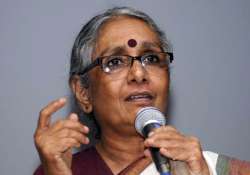Aruna Roy Attacks Lokpal Bill For Lack Of Appropriateness
New Delhi, Dec 27: Aruna Roy-led NCPRI today attacked the Lokpal Bill for its “lack of appropriateness”, saying it does not provide for adequate independence for the ombudsman or power to investigate cases. In its

New Delhi, Dec 27: Aruna Roy-led NCPRI today attacked the Lokpal Bill for its “lack of appropriateness”, saying it does not provide for adequate independence for the ombudsman or power to investigate cases.
In its critique of the Bill, the National Campaign for People's Right to Information (NCPRI) said the appropriateness of ‘The Lokpal and Lokayukta Bill, 2011' could well be determined by asking questions like whether the Lokpal is adequately independent, whether it is empowered to detect and investigate and prosecute corruption cases.
It alleged that the selection committee for Lokpal and Lokayukta is “biased” in favour of the ruling party and demanded that investigative wing of the state police be put under Lokayuktas administrative and functional control so that it has an independent probe agency.
The NCPRI also asked whether the proposed Lokpal has adequate jurisdiction so that no category of public servant is exempt from effective scrutiny and adequately accountable to the people of India.
“While welcoming the current Bill, as introduced in Parliament, and appreciating many of its progressive sections, the NCPRI believes that the Bill in its present form does not pass the above mentioned test,” the NCPRI said in a statement.
The NCPRI alleged that the Bill envisages a selection committee for the ombudsman that is “biased” in favour of the ruling party, with three of the five members either being from, or nominees of, the government and the ruling party.
“This militates against appointment of independent authorities. The selection committee should not have a preponderance of government nominees,” it said.
The NCPRI said the investigation of cases against central government employees are envisaged to be undertaken by CBI which will “not be independent” of the government.
“Though the Bill envisages Lokpal to have powers of ‘superintendence and direction' over the CBI, experience has shown that such powers are meaningless without administrative control, at least in terms of the appointments, transfers and removals, and in terms of writing the annual confidential reports,” the NCPRI said.
It also criticised the government saying the bill seems to be “vague” on the identity of the investigative agency that could be available to conduct investigations for Lokayuktas.
“As things stand, this responsibility would devolve down to the state police, which is entirely under the control of the state government, thereby compromising the independence of the Lokayuktas.
“It is, therefore, essential that Lokayuktas be given their own investigative machinery by putting the investigative wing of state police under its administrative and functional control, and strengthening it appropriately,” it said.
The NCPRI also questioned the provision on removal of Lokpal and Lokayukta members, saying the governments would decide whether to suspend a member of the ombudsman while such a complaint was pending with the court.
“Such a practice would leave members at the mercy of the government,” it said.
It also questioned the seven year time-limit for approaching Lokpal for the investigation in a corruption case saying it seems to be “unnecessarily restrictive”, especially in relation to some of the large and complex scams that are exposed from time to time.
On CVC being made the authority to investigate complaints against lower bureaucracy, the NCPRI wondered how the CVC, located in Delhi, would receive complaints, conduct preliminary enquiries, and exercise superintendence and issue directions on investigations, against lakhs of employees who are spread across the country.